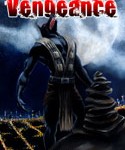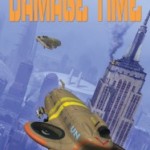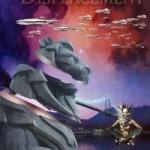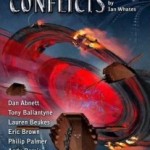 A baker’s dozen of atmospheric stories, half from TTA Press regulars including Nina Allan, Christopher Fowler, Cody Goodfellow, British Fantasy Award winner Joel Lane, Alison J. Littlewood and Steve Rasnic Tem, all wrapped in a haunting Ben Baldwin cover.
A baker’s dozen of atmospheric stories, half from TTA Press regulars including Nina Allan, Christopher Fowler, Cody Goodfellow, British Fantasy Award winner Joel Lane, Alison J. Littlewood and Steve Rasnic Tem, all wrapped in a haunting Ben Baldwin cover.
Dave Hoing is an Interzone regular from TTA’s early involvement with the magazine, but the opening –and closing- story of the anthology, ‘Plainview’ is his first crime story. The opening segment, ‘The Shoe Store’ depicts small–town America 1975; Plainview is archetypically sleepy, so quiet that the sheriff plays finger football with pieces of paper, and the most excitement to be had is that the Farm Expo was coming to the hippodrome in nearby Ridgemont in January. All the latest farm equipment would be on display. When a young girl goes missing, attention focuses on the sleazy owner of the local shoe shop. The second part, ‘The Blood Cools’ which concludes the anthology, is set thirty-four years later and has a very different tone.
Nina Allan’s ‘Wilkolak’ is another of her trademark South East London stories, most recently visited in ‘Silver Wind.’ Kip is an ordinary teenager living in Manor Park who photographs a man he is sure is a paedophile, and becomes increasingly fascinated by the so-called Manor Park Monster; He knew his interest in the monster was growing. He disliked this feeling, distrusted it, but was unable to let it go. He would have liked to have discussed it with Sonia, but was afraid that she might start to think he was weird, one of the lonely serial killer types who bought true crime magazines. Kip has the opportunity to report his discovery, but doesn’t. Utterly compelling.
In ‘The Conspirators,’ by Christopher Fowler, a meeting in one of the new super hotelsof two senior executives and an expensive whore turns deadly serious. Cynical, dryly witty and Highly Recommended.
From a desert to another wasteland for Mikal Trimm’s ‘Who’s Gonna Miss You When You’re Gone?’ Desmond is a thirty-something jailbird living with his parents in abject poverty, in a metal shack in the Florida panhandle whose floor is rusting beneath the family. There are no great surprises about the revelation of Desmond’s family secrets, but Trimm handles his protagonist’s redemption with great sensitivity, and in the end uses the stereotypes in his story to work something marvellous. Outstanding.
As is Richard Butner’s ‘Holderhaven’ which is packed with red herrings; prestignatory former Black Panther members, the restoration of an old house built at the turn of the last century and the revelation of its secrets in a leisurely stroll through history and house alike.
‘Eleven Eleven’ by Cheryl Wood Ruggiero offers a child’s eye view of the symbolism of numbers, a murder, amnesia and revelation, all wrapped in the crypto-logic of childhood: No parents were with her that day, so she assumed that she didn’t have any, which ordinary people have, which was more proof that Alsie was un-ordinary.
Ilsa J. Beck’s terrific ‘Where the Bodies Are’ opens in a wintry Michigan cemetery where the local Jewish population are all buried. Miriam watches from her psychiatrist’s office just across the street; Miriam wasn’t particularly morbid –or Jewish for that matter- and she wasn’t one of those sicko graveyard junkies. Just kept an eye on the place. When her old lover is assigned to the case of a young mother brought into hospital bearing signs of recent childbirth, he and Miriam clash, and they take the first steps toward revelation. Outstanding.
Many of the stories in the book deal with child molestation, abduction and murder. ‘Neighbourhood Watch’ by Cody Goodfellow is perhaps the only one to look at ways of stopping it. Set in a deceptively quiet suburb, the narrator is a retired security guard who, since his wife died five years before maintains a lonely vigil over his neighbours, and shows to what lengths the truly committed will go to protect the innocent.
O’Neil de Noux’s ‘K Love’ is set in New Orleans in the aftermath of Katrina and its lesser known successor Hurricane Rita. Jodie Kintyre of the NOPD finds a ‘jumper’ who has thrown himself off a roof. The suicide note in his pocket tells of a crime he has committed. Despite the snappy dialogue and rich scene setting the story doesn’t really work, reading more as a fragment of a longer piece than a self-contained narrative.
Better is ‘Living Arrangements’ by Steve Rasnic Tem. Now an old man reflecting on his inadequacies as a father, Monte is invited by his daughter Lacey to move in with her family. Monte quickly recognizes new man Pete; Monte had been a guy like Pete, pretty much. Monte guessed if he was healthier, he’d still be a guy like Pete. Pete is a mean drunk, as he demonstrates on Monte, Lacey and grandson Brian one night, but then Lacey unexpectedly offers Monte a shot at redemption.
Prison stories have a long and honourable tradition dating back to Dumas, although Stephen King is probably the chief reason for their resurgence. The latest addition to the sub-genre comes from Alison J. Littlewood, whose ‘4A.M., When The Walls Are Thinnest’ features men driven to seek escape, both from prison and from reality.
Joel Lane’s ‘The Hostess’ extends the theme of ghosts to the literal in this short but chilling tale of a horrific murder in Birmingham in the early 1980s that ends with a clever twist. Highly Recommended.
Luke Sholer’s ‘We Are two Lions’ an assassin agrees to teach his lover his trade, until the pupil begins to eclipse his master; full of twists and double-crosses, it’s clear why Sholer has been Edgar-nominated. The story is as cold and unforgiving as each man’s heart.
Crimewave has established a reputation for high quality crime fiction, sometimes with a hint of the macabre. The ghosts in volume eleven are sometimes symbolic, sometimes literal, but always present. The stories are atmospheric, the settings memorable and the characterization acute. They help make Crimewave Eleven a five-star experience.
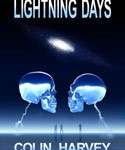 I write because I have to. It’s a compulsion, which if it’s blocked off, leads to something close to clinical depression (my name is Colin, and I am a creative junkie….)
I write because I have to. It’s a compulsion, which if it’s blocked off, leads to something close to clinical depression (my name is Colin, and I am a creative junkie….)